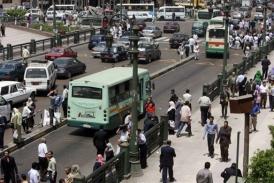CAIRO: A global slowdown in construction has lowered the cost of building materials across the world, but Egyptian contractors are still paying lofty prices for steel and other inputs, according to analysts and local press.
Egyptian steelmakers lowered their ex-factory prices from LE 5,600 to LE 3,800 per ton last month, but this is still higher than the average price of steel in markets such as Saudi Arabia, Turkey and the Ukraine, said Ismail Sadek, an analyst at the investment bank Beltone Financial.
International prices vary depending on each country’s political and economic situation. This week, local press reported that the cost of steel in Saudi Arabia and the United Arab Emirates has fallen to between LE 2,500 and LE 3,000 per ton.
Saudi Basic Industries Corp (SABIC), a Saudi firm, is reportedly selling steel for $533 per ton. One analyst said that he has heard of a ton of steel selling for as much as $613 in other countries.
One reason that prices are still high in Egypt is that local contractors have accelerated projects to take advantage of the lower input costs, said Sadek.
But when it comes to steel, contractors aren’t actually paying that much less. As steel prices dropped, local traders began to starve the market in order to cut their losses, Sadek said. This has pushed the end price of steel as high as LE 5,000 per ton.
The state has tried to counter price gouging by requiring steelmakers to announce their ex-factory prices each month and by monitoring trader warehouses, confiscating hoarded stores and selling them closer to market prices.
Contractors still report a big gap between ex-factory and end prices, suggesting these efforts have not been overly successful.
Price gouging among cement traders has been less pronounced, as cement prices have fallen less than steel, Sadek said. Local cement producers recently denied reports that they have raised their ex-factory prices.
An official at Suez Cement told Daily News Egypt the company’s ex-factory prices for Ordinary Portland Cement (OPC) were LE 455 per ton.
Steel prices began to decline in the third quarter of this year. The Beijing Olympics and Ramadan brought a halt to many projects in China and the Middle East, two of the world’s biggest construction markets. The credit crunch sparked by the financial crisis has slowed demand even more.
“There is no demand for steel, no demand for raw materials, Sadek said.
“Steel prices have fallen significantly, said Patrick Gaffney, an analyst at investment bank EFG-Hermes. “We have seen a similar impact on local prices which were as high as LE 7,650 in August coming down to LE 3,800 in November.
But local prices are often slow to reflect international shifts, Gaffney said. “Egyptian companies change their prices basically once a month, so there is usually a lag.
Local press recently reported that Egyptian steel companies agreed to lower their prices to LE 3,400 per ton in December.
But as Ezz Steel controls 67 percent of the market in Egypt, it is their decision that really matters, Sadek said. “He is the price maker, the rest are price takers, he said of the company’s chairman.
So far Ezz Steel has priced defensively, keeping rates at a level that repels international traders without fully reflecting worldwide price drops, Sadek said.
Lower construction costs have not lowered local real estate prices significantly, Sadek added. Firms are reluctant to lower prices because they do not want to lose credibility with the clients who recently bought homes at higher prices and are now waiting for their houses to be built, he said.
Analysts say it is hard to predict how much the global slowdown will affect Egyptian steel and cement exports, but it is generally expected to hinder them.
Egyptian firms’ competitiveness versus local producers depends on a variety of policies and economic conditions specific to each market. In the Gulf, one of Egypt’s main export markets, the fate of many construction projects is still unclear.
The state lifted export fees for steel, previously LE 160 per ton, in October. A ban on cement exports, implemented in March, has also been lifted.


